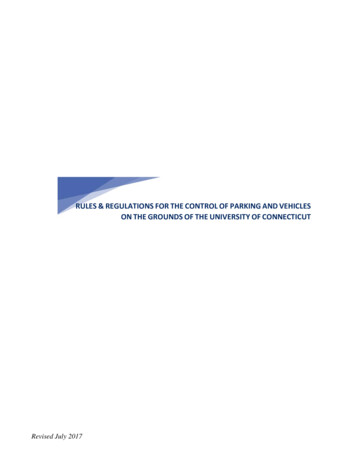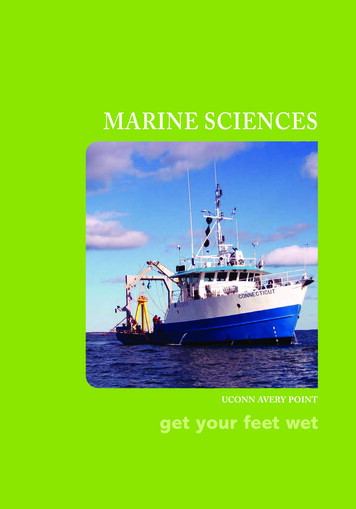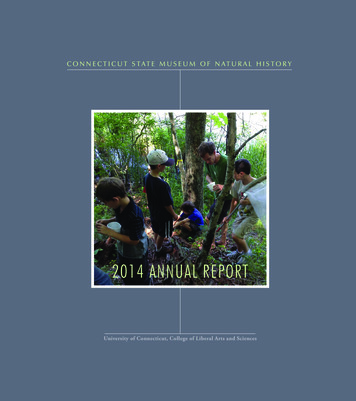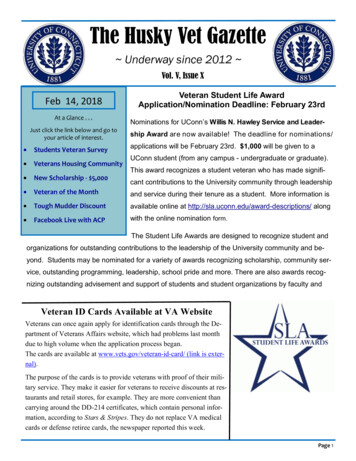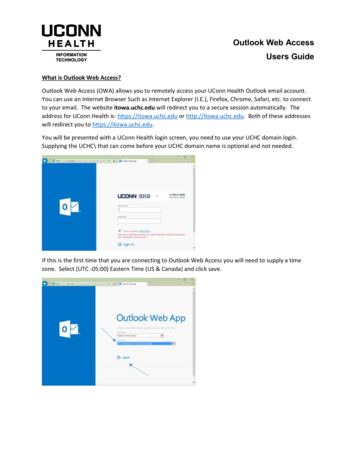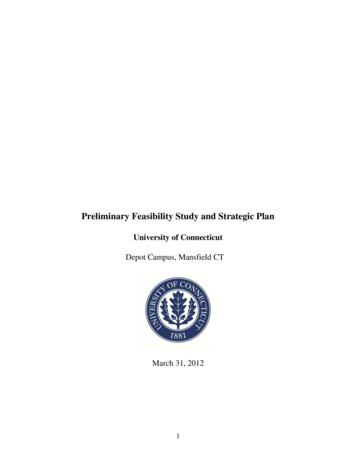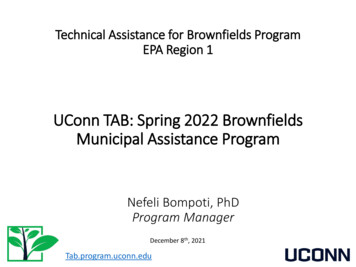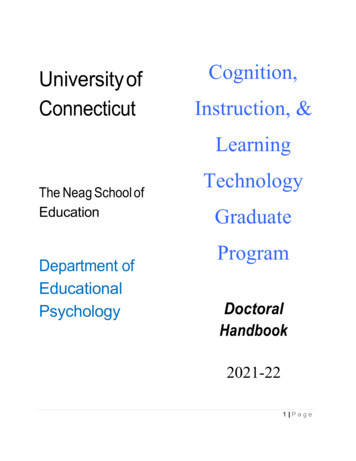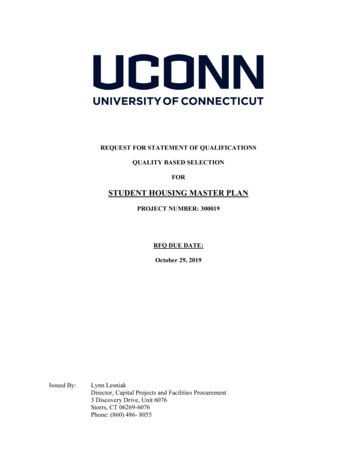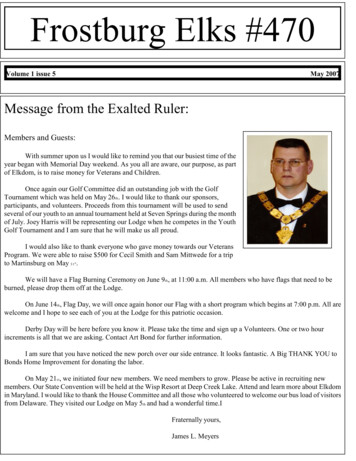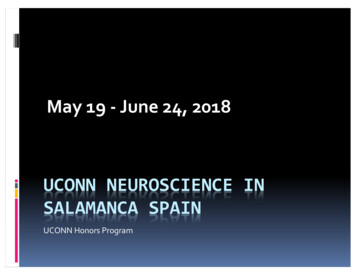
Transcription
May 19 - June 24, 2018UCONN NEUROSCIENCE INSALAMANCA SPAINUCONN Honors Program
Topics for this session§ Admissions – who goes to our program?§ Neuro Courses§ Spanish Courses§ A typical day in Salamanca§ Living, eating and drinking in Salamanca§ Travel while in Spain§ Prague – Neuroscience Methods course§ Cost
2010
2009- First afternoon
University of SalamancaWhere’s the frog?
Admission to the Program§ 3rd Year Studentú Should have been on campus 2 years§ GPS 3.0 or higherú Science GPA is most important§ Must have prerequisites for the neurosciencecourse offered§ Maximum 50 students on the trip
Opening Reception 2011
Who goes to our program?§ UCONNUndergradsúúúúPNBMCBPsychologySLHS§ Graduatestudentsú UConn HealthúúúúúNeuroscienceUCONN gradsU MassU HartfordNetherlandsGermanyOTHER SCHOOLS§ Johns Hopkins**§ Purdue**§ U Mass-Amherst*§ Bard§ Colby§ Conn College§ Florida State§ Fordham§ George Washington§ Hofstra§ McGill§ MIT§ Rhodes§ Oberlin§ Ohio State§ SUNY Albany§§§§§§§§§§§§§§§§Tulane*U Arizona*U DelawareU Florida*U IowaU Kentucky*U Michigan*U North CarolinaU Pittsburgh*U South FloridaU Texas*WesleyanWilliamsU VermontU VirginiaU Col Wooster
Opening Reception 2015
Academics: Neuroscience§ Neuroscience class 2 hrs/day; Four days/week§ MEDS 5377: The Neurobiology of Hearing.Offered each year. Graduate school course(Honors)§ PSYC 2201: Drugs and Behavior. Offered in2017. (Honors)§ PNB 3251: Biology of the Brain. Offered in2018 (Honors)
Instituto de NeurocienciasCastilla y Leon
Salamanca 2012Nell Cant, Duke University
Neurobiology of Hearing(MEDS5377)§ UCONN Health Center graduate course with§§§§§honors credit for undergraduatesJohns Hopkins elective for NeurosciencemajorsNeuroscience research on the auditorysystemAll faculty currently do researchDiverse topics from molecular to behavioralOther students are Neuroscience majors fromother universities
Neurobiology of Hearing withBrad May (2011, Johns Hopkins)
Neurobiology of Hearing§ Gradingú Write papers and critiques; quiz; group presentionú Propose an hypothesis-driven experiment based onlectures from previous weekú Write a critique of another student’s paperú Group presentations final week§ Prerequisites for this course:ú Best preparation is introductory neuroscienceBiology of BrainSensation and PerceptionPhysiological Psychologyú Substitute courses will be considered
Enrique Lopez-Poveda and Kemar
Neurobiology of HearingFaculty 2018§ Douglas Oliver, Director, UConn Health§ Delores Lopez, University of Salamanca§ Enrique Lopez-Poveda, University of Salamanca§ Manolo Malmierca, University of Salamanca§ Miguel Merchan, University of Salamanca§ Gerard Borst, Erasmus University, Rotterdam§ Dan Polley, Eaton Peabody, Mass Eye and Ear, Harvard§ TBN§ TBN§ TBN
Drugs and Behavior (PSYC 2201)§ John Salamone, Psychology§ Drug effects on chemical transmission in CNS§ Behavioral/psychological effects of drugs§ Basic principles of psychopharmacology§ Survey of drugs (e.g., stimulants, antipsychotics,antidepressants, antianxiety agents)§ Focus on drugs of abuse§ Text: “Drugs, the Brain, and Behavior”ú (Grilly and Salamone, 2011)§ PREREQUISITES: Psyc 1100, Bio 1107, or consent
PSYC 2200: PhysiologicalPsychology§ Dr. James Chrobak, Psychology§ 3 credits, Honors§ Introduction to how neurobiology influences behaviorand cognition. Emphasis is on forebrain emoryPsychological , neural, and psychiatric dysfunction§ Format: PowerPoint lecture; films; optional studentpresentations§ Requirements: 5 short, multiple-choice exams plus finalexam§ Text/Materials: 1 text; supplemental online readings
PNB 3251: Biology of the Brain§ Instructor: Dr. Radmila Filipovic, Physiology and Neurobiology§ 3 credits, Honors§ Brain functions, from molecular to cellular and overall centralnervous system organizationúúúúionic basis of resting and action potentialssynaptic transmissionsensory and motor systemsplasticity§ Upper-level undergraduate physiology & neurobiology majors§ Also majors in the neurosciences, biological sciences, andpsychology.§ Required text: Purves, et al, Neuroscience, 5th Edition.§ Students assessed on classroom participation andexaminations.§ Prerequisites: One 2000-level course in PNB or consent ofinstructor.
Teaching Staff 2016
Teaching Staff 2017
Academics: Spanish§ Spanish Class 2 hrs/day; Four days/week§ SPAN 1001/1002 –Spanishú Beginning or intermediate levelsú 15 students per classú Introduction to Spanish culture§ SPAN 1193 -- Options for advanced Spanishspeakersú Medical Spanish – nearly fluent speakersú Advanced Scientific Spanish – fluent speakers
Advanced Spanish Class 2010
Spanish Class
A typical day in Salamanca§ 7:30-8:30 am Spanish breakfast§ 8:30/9-11 am Spanish class§ 12-2 pm Neurobiology of hearing§ 1:30-4 pm Lunch (big)§ 4-6 Drugs & Behavior or Bio of the Brain§ 7-10 Tapas time§ 9-11 Dinner (small)
DORMITORIES IN 2017:SINGLES: Ana Mogas (Translate in Google Chrome)DOUBLES: Hernán Cortés Residence HallJoaquín AlonsoColegio Mayor de OviedoAldaba Rector
Food and e-foods-in-salamanca/
The Spanish arethe worlds bestsnackers
20112012
Mandala:My favorite coffee bar& veggie restaurant
Local sightsChocolate?
Local sights - Cathedral
Cathedral
Local sights– Convent ofLas Duenas
Las Duenas
PontificateUniversity
Casa deConchas
Plaza Major at night
Salamanca at night
Travel while in Spain§ Weekend or day trips to Madrid andmuseums (Prado, Reina Sofía)§ Day trips to Segovia or Avila§ Three-day weekend trips toú Toledoú Portugalú Bilboa§ Longer trips to Sevilla, Cadiz, Lisbon,Barcelona(best for end of term)
396 km822 km213km471 km459 km100 km 1 hour632 km
Avila isnearby – 90 km
SEGOVIA
Seville
SEVILLE
Royal Castle - Madrid
Go to Prague
Neuroscience Methods inPrague, Czech RepublicInstitute of Experimental Medicine, Czech Academyof Science§ In 2018, limited to 30 students who all take themethods course§ Friday to Sunday- Travel to Prague & Tour§ Monday- Prague Methods day 1, 9 am – 2 pm§ Tuesday- Prague Methods day 2, 9 am – 2 pm§ Wednesday- Return to Salamanca
Neuroscience Methods ProgramDAY 1 – Introduction to Four Methods Acoustical measurement and stimulation Zbynek Bureš, Milan Jilek Anesthesia, surgery, auditory evoked responses Jirí Popelár,Tetyana Chumak, Jolana Bartošová Behavioral methods in auditory research Daniel Šuta, NataliaRybalko Basics in immunohistochemistry, stereology and quantitativemorphology Ladislav OudaDAY 2 – Introduction to Four Methods Patch clamp and brain slices RostislavTurecek, Michaela Králíková,Kateryna Pysanenko Single and multiple unit recording Daniel Šuta, Jirí Popelár, JolanaBartošová, Tetyana Chumak Two-photon microscopy in the auditory cortex of mouse OndrejNovák, Ondrej Zelenka Measurement of otoacoustic emissions and subjective audiogramJirí Popelár, Milan Jilek, Oliver ProfantDinner at the restaurant Natýlouce zelený
Castle
Cathedral in Castle
CharlesBridge
Charles Bridge
Charles Bridge
Jewish Cemetery
Lennon Wall
Franz Kafka Houseand Street
Old Town Square
Prague 2015
Study Abroad Budget (Draft)Budget Item Differ for UConn/Non-UConn Students andGraduate/UndergraduateSTUDY ABROAD FEE (SUMMER) * 475SUMMER ENROLLMENT FEE * 45TECHNOLOGY FEE 30PROGRAM FEES * 1915ROOM AND BOARD * 1800HEALTH INSURANCE (2 MONTHS) * 84ITEMS PAID BY YOU – BILLED BY UCONN 4349EXTRA FOOD 500AIRFARE 1500PERSONAL EXPENSES INCLUDING TRAVEL WITHIN EUROPE 500
Comparison to Storrs Tuition
Closing Reception 2016
Manolo is waiting for you
ine February 20
Academics: Neuroscience §Neuroscience class 2 hrs/day; Four days/week §MEDS 5377: The Neurobiology of Hearing. Offered each year. Graduate school course (Honors) §PSYC 2201: Drugs and Behavior. Offered in 2017. (Honors) §PNB 3251: Biology of the Brain. Offered in 2018 (Honors)

